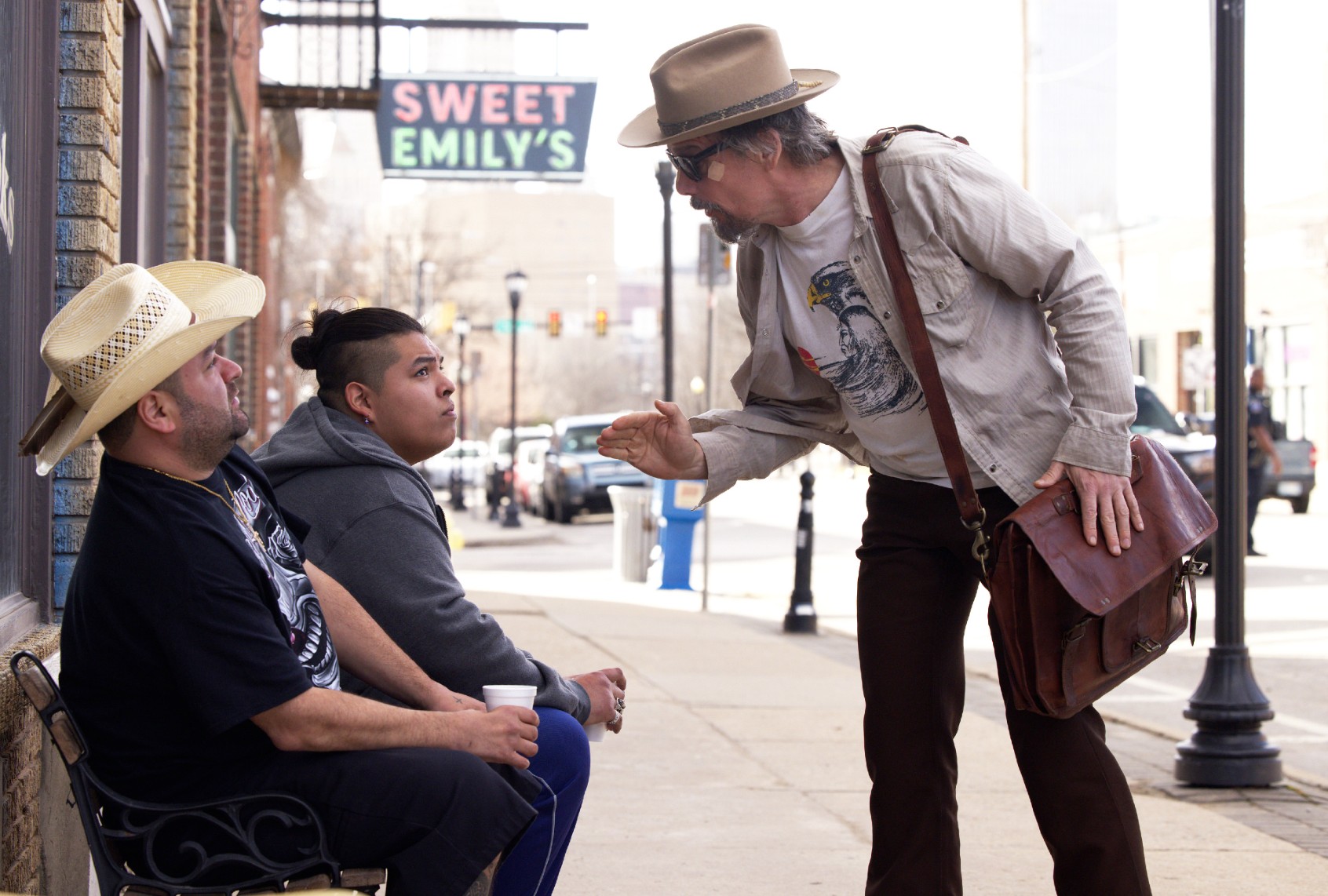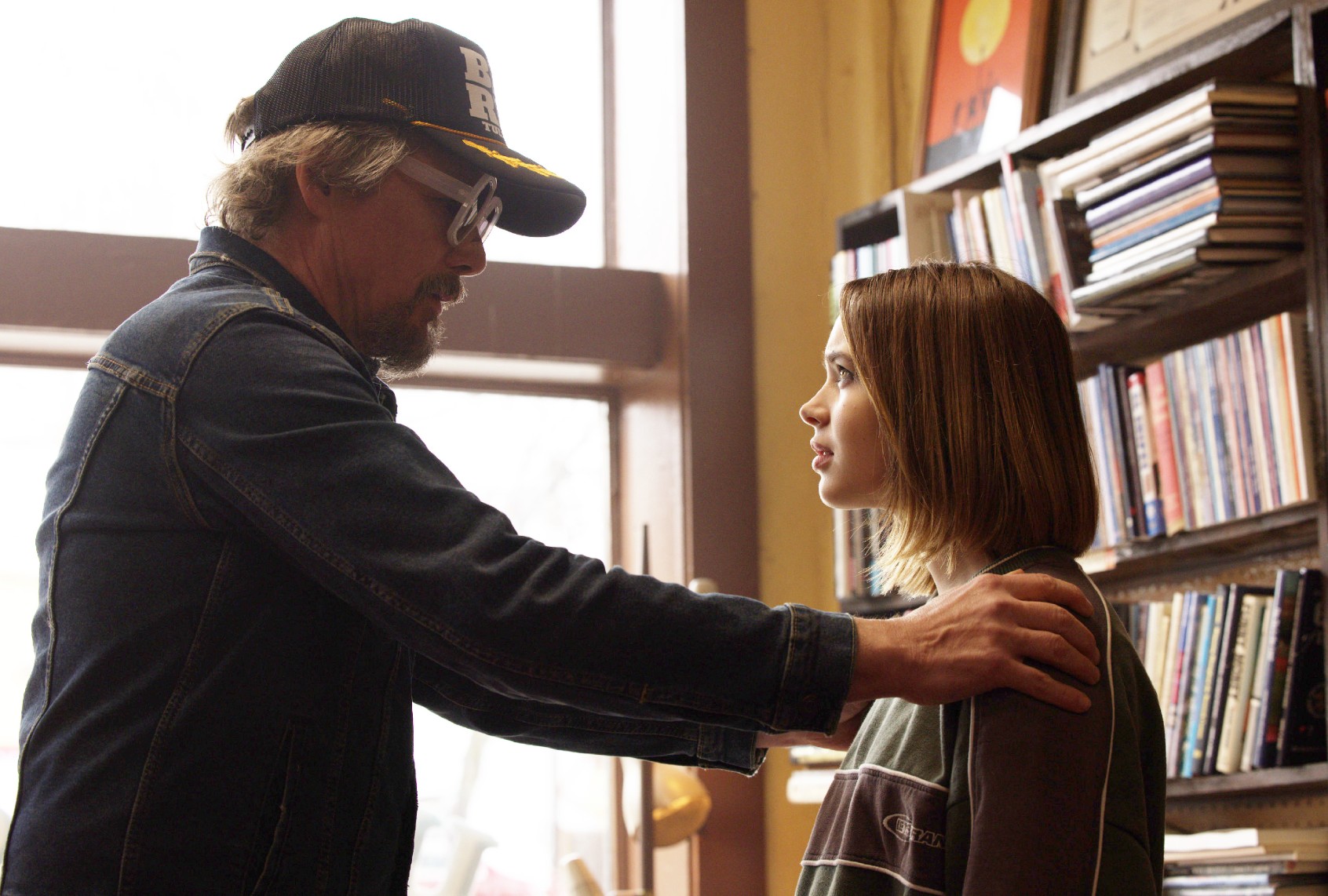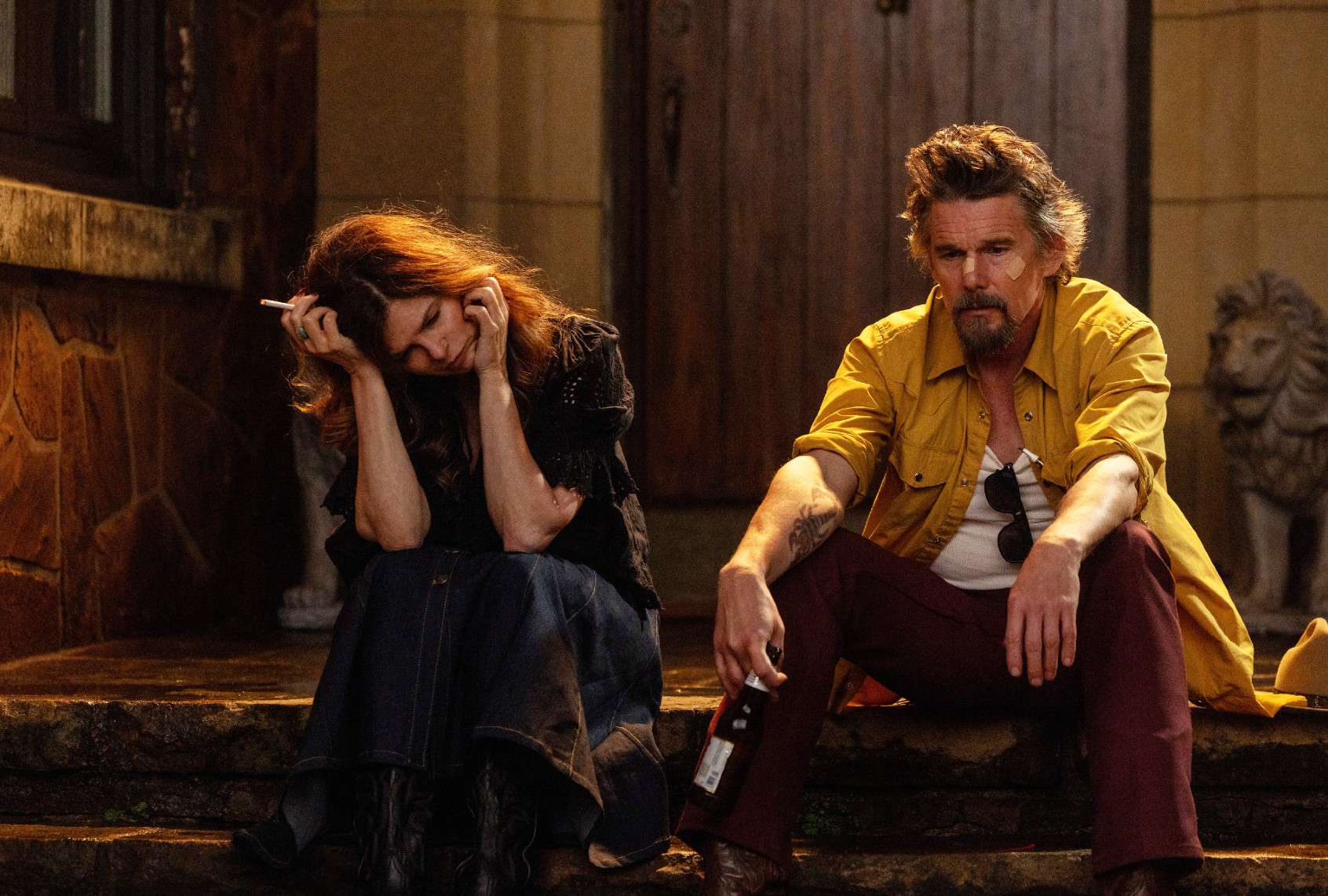Ethan Hawke invoked Robert Redford‘s name during a conversation about “The Lowdown” that took place the day after the cinematic icon died. Both Hawke and series creator Sterlin Harjo have significant connections to Redford’s Sundance Institute system, but what compelled the actor to pay his respects to the Hollywood legend was a twice-repeated sentiment in the show’s pilot: “There’s nothing worse than a white man who cares.”
Keith David’s private investigator, Marty, says this to Hawke’s Lee Raybon, the so-called “truthstorian” obsessed with digging up dirt on the Washbergs, one of Tulsa, Oklahoma’s most powerful families. Marty is working for gubernatorial candidate Donald Washberg (Kyle MacLachlan) and doesn’t understand why Lee wants to take him down so badly.
Tulsa Beat publisher Cyrus Arnold (Michael Render, aka Killer Mike) is the second person to share this cautionary wisdom with Lee – “white men that care, saddest of the bunch” – scornfully shaking his head at both Lee and himself for accepting his latest pitch. Cyrus knows Lee is going to get himself into trouble. But the newsman only has himself to blame when he shows up to work one day after publishing Lee’s latest blockbuster naming a couple of local skinheads in a crime, and finds his office window shattered.
“Sometimes you end up trying too hard, and things sort of fall by the wayside or get eaten up by the try-hardness of it all,” Harjo said. This describes Lee in a nutshell.
Given that context, Hawke’s musing about one of Redford’s obituaries makes sense. The actor found the writer’s take to be very cynical: “This is a great life, and he was a white man who cared. And he was met with, ‘God, this guy, he’s so full of himself.”
Then again, knowing what he knows about such men, Hawke concedes that people like Marty and Cyrus might think that way. “I thought, ‘That’s what they would say.’”
There’s no need to wonder whether that’s true, since I spoke with David in a separate conversation. Regarding Lee’s demonstrations of caring and that memorable line, he paused to measure his words carefully before observing, “When people think that they care, and they want to talk to you out of their caring about their insight into your life . . . from a humanitarian point of view, I really appreciate that. But you’ve got it twisted, because that ain’t the way I see things, and that’s not my reality.”
That line resonated deeply within David, he told me, “because it’s the reality that I live. I’m a Black man in America.”
“The Lowdown” is a Tulsa noir mystery led by Hawke’s citizen detective, a rare bookseller who dedicates more time to uncovering local conspiracies than selling coveted editions of old novels. He very much believes he’s doing right by Tulsa’s everyday people, a working-class community at the mercy of men like Donald Washberg and the capitalist power brokers silently enabling his political career. But that devotion to exposing corruption comes at a price frequently paid by the communities least deserving of the blowback.
Yet Harjo wrote Lee as a tragicomic figure perpetually floundering his way through his investigations and his life, taking his share of black eyes and deadly near-misses in the bargain. “Sometimes you end up trying too hard, and things sort of fall by the wayside or get eaten up by the try-hardness of it all,” Harjo said. This describes Lee in a nutshell. It also applies to many of us who are currently grasping at the best ways to confront the injustices in our country, to say nothing of those occurring in our own backyards.
“Lee, you know, he’s fighting for the truth. But at what cost are you going to keep fighting for and moving forward towards the truth? Who’s going to suffer from it?” Harjo asked. “Sometimes privileged people don’t listen. Luckily, Lee does listen to a lot of people around him. And eventually, even if he doesn’t adhere to their advice, you know, he still hears them.”

(Shane Brown/FX) Cody Lightning, Jude Barnett and Ethan Hawke in “The Lowdown”
“The Lowdown” reunites Harjo and Hawke, who both serve as executive producers on the drama, after the latter made an unforgettable guest star appearance on Harjo’s previous FX series, the critically acclaimed, genre-defying “Reservation Dogs.” Hawke played Rick, the long-lost father of Devery Jacobs’ Elora Danan Postoak. Rick is a solid parent to his current family, and when Elora tracks him down, he welcomes her to get to know her half-siblings.
Lee isn’t quite the shadow version of Rick; let’s call him a contrast. He’s very present in his daughter’s life and even has her tag along for a few of his more questionable adventures, like tracking a dead man’s book collection to a local lake. He ends up being held hostage by a couple of the locals while his kid procures what he’s looking for and almost gets into serious trouble herself.
This being a show that champions truth, justice and philosophically resonant prose, Lee and his kid skate free of trouble. His way with words even saves his life, since the man he crosses happens to be heartbroken and easily gratified by his trespasser’s willingness to pull a Cyrano de Bergerac on his behalf.
We need your help to stay independent
That makes it simultaneously relevant to this moment in our culture and politics, as well as a fantasy. Lee is a warrior poet who claims to hate poetry, and Hawke sees Lee as more confused than anything. “I love somebody who’s living their life on a mission. His mission is noble, even though he is not, you know,” he said. “He’s the guy who’s talking about the value of truth all the time while he’s lying to his daughter.”
“The Lowdown” is also Harjo’s ode to the noir films he loves dearly. He cites Robert Altman’s “The Long Goodbye” as his main jumping off point — “I was just sort of obsessed with it. During the pandemic, I watched it, like, five times,” he told me — but he also namechecks an array of other noir and neo-noir classics that he says he borrowed, stole from or shouted out in making this show. “The Killing of a Chinese Bookie.” “The Drowning Pool.” “Chinatown.” “Night Moves.” And, yes, “The Big Lebowski.”
Apart from “The Drowning Pool,” all these films are set in Los Angeles; “Drowning Pool” features Paul Newman as an L.A.-based detective tracking a case in Louisiana. Nevertheless, there’s a tendency to associate noir thrillers with big cities that Harjo reframes by setting his within his home state.
“I love somebody who’s living their life on a mission. His mission is noble, even though he is not,” Hawke said of his character, Lee.
“We think of big cities and noir because of the corruption and the things happening underneath the surface that are colliding. That is happening in a lot of places in the middle of America right now,” Harjo pointed out. “The flyover states are sort of dictating the future right now. At what point do you not acknowledge that they’re important?”
Harjo is right. Tulsa is a nexus for conversations about history erasure and racial tension, both of which feature heavily in the show’s emerging subplots. He referenced the city’s founding by the Muscogee Creek native people, the area’s oil boom and the 1921 race massacre that only recently resurfaced in the national conversation as evidence of its cultural pertinence.
“I love what Sterling goes after in terms of how, in the storytelling, the politics of our time will be revealed,” offered David, ”especially in relationship to the past and how we’ve thought about the past.”
Widening that lens beyond Tulsa gives Cyrus and Marty’s line a more nationally relevant and less sympathetic perspective. When we think about the white guys who care, it isn’t scruffy, banged-up dudes like Lee who come to mind. California’s slick governor and presumed 2028 presidential candidate Gavin Newsom is busily positioning himself as the nation’s leading White Guy Who Cares. He’s also campaigning to be one of the worst by disavowing progressive stances, such as support for transgender rights.

(Shane Brown/FX) Ethan Hawke and Ryan Kiera Armstrong in “The Lowdown”
MacLachlan’s Donald Washberg tries to play a similar game by, for instance, hosting a memorial service for Dale at a local Black church, even as the white businessmen funding his political efforts from the shadows conspire to buy up Black-owned businesses for a project Lee assumes will be detrimental to that community.
Meanwhile, the area’s wealthy power brokers are also moving to silence the Tulsa press in whatever way they can, whether via lawsuits or physical intimidation.
“Corruption happens everywhere, and the fight for truth is important, I think, throughout the world,” Harjo observed. “And you know, cinematically speaking, you haven’t seen Tulsa at all, so I wanted to really show it speak about truths and speak about corruption and speak about dark and light, and bring all of that together, similar to what I did with ‘Reservation Dogs.’”
In doing so, Harjo added, his goal isn’t to make anyone flinch, but tell the truth about darkness, light and what’s underneath “from a place of love.”
Start your day with essential news from Salon.
Sign up for our free morning newsletter, Crash Course.
That’s where Lee Raybon comes in. By no stretch is he the baddest or saddest figure in his story – that prize may go to Donald or his dead younger brother Dale (Tim Blake Nelson), whose death Lee, and only Lee, finds to be suspicious. It was officially ruled a suicide, but Dale left behind a series of notes intended for someone like Lee to question and mistrust everyone.
Of course, one of those people Dale names is his bereaved wife Betty Jo (Jeanne Tripplehorn), with whom Lee spends a boozed-soaked, sex-fueled evening — much to Donald’s consternation, since he was also having an affair with her.
“The thing that I love about being part of Sterlin’s work and what this show is doing is there’s not a lot of finger-wagging about who’s right and who’s wrong,” Hawke said. A lot of us Americans are trying our best, he continued, acting from multiple points of view.
However, he offered, there are some foundational truths that have to be mutually agreed upon and explored. “Without it, we’re going nowhere. And so the show is feeling extremely relevant, more relevant than we were first dreaming about it,” he said.
Indeed, when asked who he had in mind when writing that line about the sadness of white men who care, Harjo gently grinned and answered, “Everyone I know.”
New episodes of “The Lowdown” air at 9 p.m. Tuesdays on FX and stream on Hulu the next day.
Read more
about this topic


